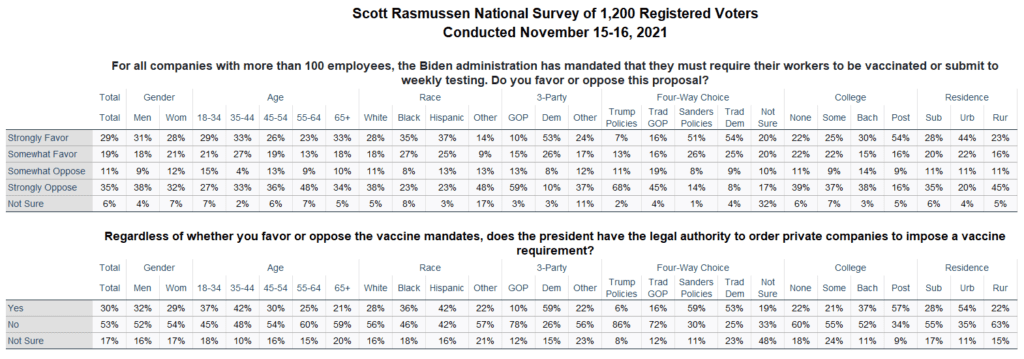Forty-eight percent (48%) of voters the Biden administration’s attempt to mandate COVID vaccines for all workers at companies with more than 100 workers. A Scott Rasmussen national survey found that 46% are opposed.
Those figures reflect a decline in support over the past two months. In mid-September, 54% favored the mandate and 37% were opposed.
One possible reason for the decline is that 63% of voters have experienced supply chain problems. Fifty-nine percent (59%) favor relaxing vaccine mandates to ease the supply chain problems.
The survey also found that a majority of voters (53%) do not believe the president have the legal authority to impose his order on private companies. That’s up eight points since September.
Thirty percent (30%) now believe the president does have the authority to implement the mandate. That’s down three points over the past two months.
The question of legality is currently working it’s way through the courts.
SIGN UP to receive Scott’s free email newsletter.
CHECK OUT Scott’s latest polls.
Note: Neither Scott Rasmussen, ScottRasmussen.com, nor RMG Research, Inc. have any affiliation with Rasmussen Reports. While Scott Rasmussen founded that firm, he left more than seven years ago and has had no involvement since that time.
Question 1:
For all companies with more than 100 employees, the Biden administration has mandated that they must require their workers to be vaccinated or submit to weekly testing. Do you favor or oppose this proposal?
29% Strongly favor
19% Somewhat favor
11% Somewhat oppose
35% Strongly oppose
6% Not sure
Question 2:
Regardless of whether you favor or oppose the vaccine mandates, does the president have the legal authority to order private companies to impose a vaccine requirement?
30% Yes
53% No
17% Not sure
Methodology
The survey of 1,200 Registered Voters was conducted online by Scott Rasmussen on November 15-16, 2021. Field work for the survey was conducted by RMG Research, Inc. Certain quotas were applied, and the sample was lightly weighted by geography, gender, age, race, education, internet usage, and political party to reasonably reflect the nation’s population of Registered Voters. Other variables were reviewed to ensure that the final sample is representative of that population.



